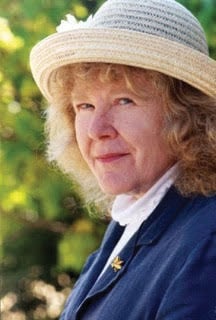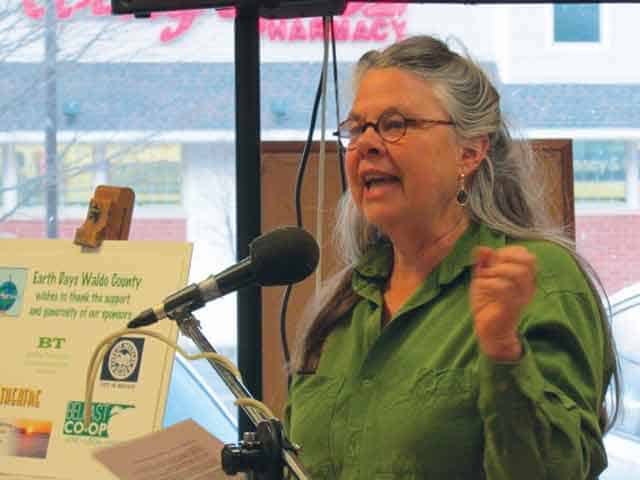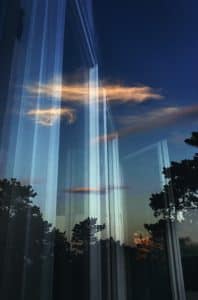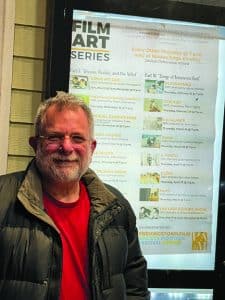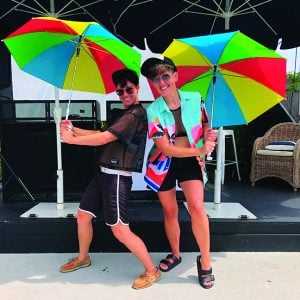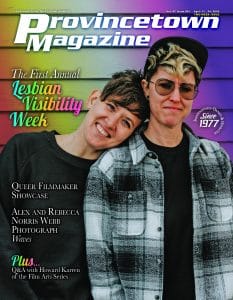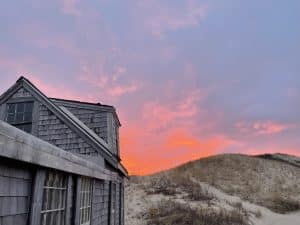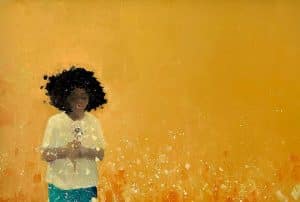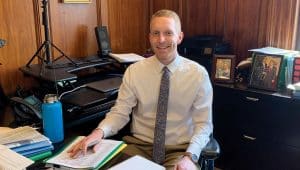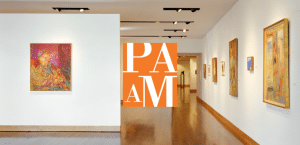by Rebecca M. Alvin
For seven years, WOMR/WFMR Outermost Community Radio has sponsored an annual poetry contest. The Joe Gouveia Outermost Poetry Contest is named in honor of the former Cape Cod Poet Laureate, “in honor of his commitment to the poetry community while supporting a great community asset.” In years past, we’ve peppered our spring issues with the winning poems, in both the regional and national categories, but this year, in honor of National Poetry Month, we’d like to share five poems all in one space to celebrate this art form. This collection demonstrates how diverse the inspirations that lead to poetic expression can be.
Marge Piercy selected the finalists for the regional and national categories. The regional winner, Lucile Bart of South Wellfleet, was awarded $300 for her poem “Reservoir,” and the national winner, Karin Spitfire of Belfast, Maine, was awarded $1000 for her poem “Liquidation.” Here we share Spitfire’s poem, as well as “Among the martyrs,” the second-place national winner, written by Kathleen O’Toole of Takoma Park, Maryland, “Day Five: Driving through the reservation,” the third-place national winner, written by Joyce Thomas of Castleton, Vermont, as well as “Burning Truths,” the second-place regional winner by Mary Collins of East Sandwich, and “My Mother Came Back as A Cat,” the third-place regional winner by Wilderness Sarchild of Brewster.
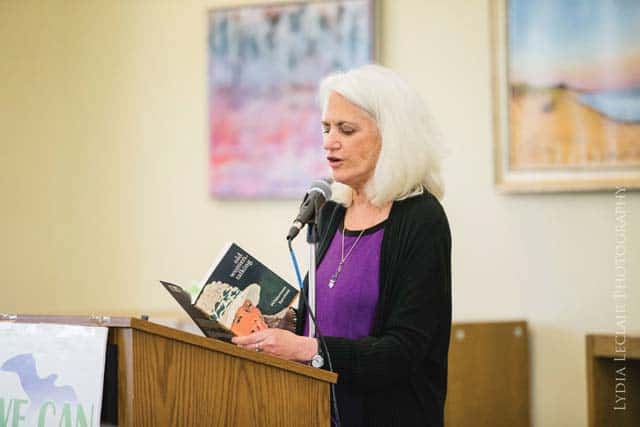
by Wilderness Sarchild
She loves to sleep on the couch
purring
dreaming
flicking her ears
tongue bathing.
She knows who I am now.
Just like before, her eyes light up
when I enter the room.
Unlike before, her eyes continue
to monitor my presence.
She no longer dances
wears diapers
or throws tantrums
at the nurses.
She lies peaceful
on my lap
happy to be back
happy to not be a burden.
Day Five: Driving through the reservation
by Joyce Thomas
I think of the dogs also
cut down like children
at the entrance to houses and kivas
because they objected
to the slaughter of innocents,
to the bullets like arrows and Anglos
caught up in the free-for-all
massacre of sheep, cattle,
horses, goats–livestock
Uncle Sam declared too much in 1934;
and I picture the carcasses
left to rot among the scrub brush
and prickly pears, the collapsed dumb
animals in heaps
like the mounds of bison,
over 30 million slain in twenty years;
like the Sioux fallen
at Little Big Horn, the painted Lakota,
Cheyenne, Arapaho warriors
whose bodies also
were forbidden the natives to touch
or bury their bones;
and I hear the blue sky crack
with the cries of Navaho
children, women, men as they looked on
the flat table
of the plains and gouged arroyos, sandstone
cliffs like ladders leading toward
the mute ancestral gods–
and I imagine I see, briefly, through their eyes
only dark birds move:
ravens at the feast.
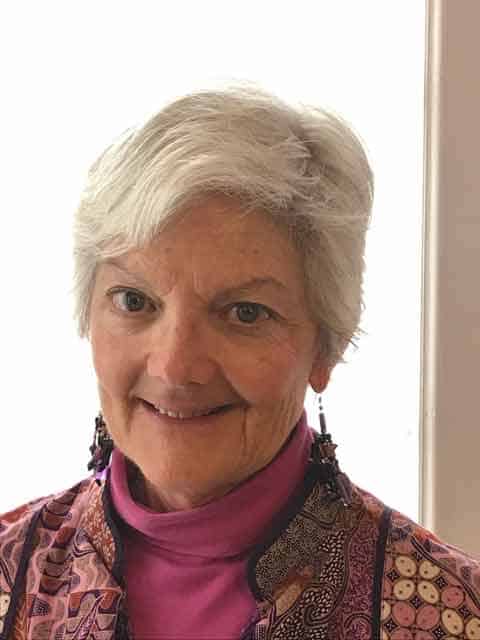
by Kathleen O’Toole
Jimmy Lee Jackson was 26, on February 18th
1965, when a state trooper slammed him
against the cigarette machine in a dark café
where he and other voting rights marchers
sought refuge. Where exactly was I, that night,
three days past my thirteenth birthday,
when the streetlights went out in Marion, Alabama?
Perhaps I was engrossed in history homework,
or dreaming of stealing a kiss with Peter, backstage
after the school play, when Trooper Fowler fired
the fatal shots making Jimmie Lee a martyr
on the road to Selma?
Jimmie Lee Jackson was not
among the martyrs, or history, we were studying
in our classrooms full of white girls, daughters
of working class Catholics, well protected
in our corner of Wilmington, while black citizens
and clergy from city churches set out to join
the Selma campaign. Ms. Lillian, one of these ‘saints,’
would teach me a chapter of Delaware history
I’d missed: how the National Guard patrolled
her streets in ‘68, so we could get to school.
our fathers to work, and our suburbs rest in peace.
Half a century later, an obituary: one James Bonard
Fowler —Jimmie Lee’s executioner, stirs up
these histories. I see the ex-trooper finally served
a measly six-month sentence in 2010, after
he dogged a reporter to claim he killed
the unarmed marcher in self-defense. In his story
I trace the contrails of white rage—careering
from workplace assault to Vietnam valor to heroin
trafficking, for which he served more time
than for killing Jimmie Lee. You’d think by now—
after Charleston and Ferguson, after the litanies
of named victims: Trayvon and Michael, Freddie
and Tamir—we would have cornered this hate
like you’d salk a mountain lion menacing the city.
When will we hear who is my neighbor?
for real, unmask the parallel lives we’ve led
and re-write these histories, starting
with why—and why not?
Liquidation
by Karin Spitfire
For 36 years I’ve slept on some shore of Penobscot bay
paddle the east and west branches of the Penobscot river
transverse Penobscot county to get to medway, lincoln, the golden road
visit Penobscot marine museum, Penobscot theater company, read Penobscot pilot, smell
the Penobscot potato factory, wake up to the weather on bay
Penobscot river watershed covers 8,750 square miles
from bucksport to the canadian/maine border
extends with some easy portages to the Allagash into the st. john
all the way to new brunswick or over to the Kennebec down to popham
and the bay, from the bay you can get anywhere, Schoodic, Monhegan
I know a few of the carrying places, can read the waters some
know where I might find wild berries, sight eagles, great blue heron,
from castine to isle au haut, brooklin to camden hills, belfast to mt. desert
know where I might go swimming Megunticook, Pemaquid, Naskaeg
names I have learned to say the settlers way, but none we appropriate like Penobscot.
a mispronunciation of the people’s name for
themselves, the river, the land, Penawapskewi,
meaning the river the land the people
here for some 13,0000 years, 90% annihilated by incoming immigrant germs, the
remaining estimate of 10,000 in 1700,
fought with the colonist in their revolution, now number under 2,000,
cut down by genocidal scalp bounties, war, alcohol, child abduction
The Penobscot treatied into a 22 square acres of their homeland,
a swath of the river and its islands from medway to old town
now the state that dubs itself maine
claims this stretch, the river, does not include the water.
Penawapskewi, land, Penawapskewi, river, Penawapskewi people
Burning Truths
by Mary Collins
Behind the featureless facades
Of barely-lit streets
Russia’s poets gathered in secret
To read aloud—cautiously, quietly aloud,
What they had made,
Sharing the fruit of this easier kind of labor
That only in its undiscovery
Spared them the harder, frigid kind,
Of breaking rock and mining salt,
Hungering for absolutely everything.
Drapes were drawn against the deepening dark,
Coats defrosted on the stand in the hall,
A samovar murmured, sighed, spat,
And steam spent itself above cups
Of coppery, formidable tea.
They offered up sonnets and ballads and pastorals,
Songs to springs that must go unserenaded,
Elegies to freedom and other nascent things
The hand must stay
And leave unborn.
They leaned in,
Attending to one another in the benign light
Of glazed lanterns and pulsing coals,
Eyes shining,
Joy doused by the knowledge
That they will hear these words once only,
Speak their own work only once,
Never to hear it again;
Each in his turn aware
That the only ears to hear
The shape of the truth he lives by
Are these,
Turned now toward him
The only response to his call this one,
Here,
Now.
At the end of the evening,
Their feast of words over,
The sharing done,
They take out and place before them
A shallow silver bowl,
A thing akin to a ciborium for consecrated bread,
And each in his turn
Lays into the bowl his pages,
And with a taper lit from the dying fire
Ignites them,
Lets them burn,
Watches his words till they are gone,
Lost forever to those of us
Who might have held them,
Warmed our hands in them,
Recited them to one another before a different dying fire,
Repeated them while we still can,
Shared them with a world hungry for absolutely everything.
The dark, damp coats were hard to tell apart
When they slipped them from their hooks
And stepped out into a night empty but for
A sickle moon, the clipping of an oligarch’s nail.
In silence they walked separately
Into the shadows,
Spent,
As though mining salt
Could be no harder
Than burning words.

